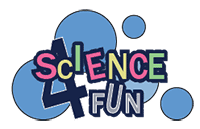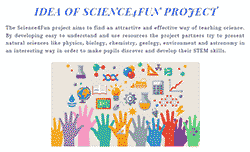

The training will be adapted in particular for learners, and especially women, to draw their attention on science in a simple way with the purpose to discover/ stimulate and develop their talents.
There are 9 partners from 8 European countries ( Netherlands, Spain, Poland, Belgium, Portugal, Bulgaria, Slovenia and Czech Republic) and the model will be tested and evaluated in each partner country.

Newsletter to download here.

More than 200 students took part in the testing. Children learn in a fun way new information from the field of natural sciences.
PFor more information, open our newsletter no.4.

Launch of questionnaires for students has been prepared, the questionnaires focus on learners at EQF1 to EQF3 level. The launch is planned for September 2020 with the aim to get data for further usage.
There was an online meeting of project partners held in July 2020. Partners evaluated the achievements and planed further activities.
Download the newsletter here.

A total of five schools from the Czech Republic and 300 pupils will participate in the project. The tests are not about determining the level of knowledge and skills but they contain questions and interesting things that should motivate students to study science disciplines. First round of tests is to be introduced during the summer camp in the Maximum language school and we shall see how the tests work and how much children enjoy them.

One of them is focused on fluid exchange and is very useful when teaching about gravitation. Experiments are fun and children enjoy them a lot.

For example, the effect of gravitational force on liquids can be easily simulated using commonly available aids. Instructions are in the video below:

For example, as the following video shows, a simple experiment suitable for secondary school students. The video was created in cooperation with the Comenius Elementary School in Kroměříž.

The videos are illustrative and they include lists of the necessary tools. An example is the lava lamp, an experiment suitable for pupils in the senior years of primary schools. It will help to understand how polarity affects density.

There are developed video podcasts with experiments in physics, materials in chemistry, biology, etc. Everything is translated and prepared to be published at the project website www.science4fun.eu.
Download the Newsletter here.

The training was successful so partners can now share the newly gained knowledge.
Photos from the meeting - by clicking enlarge photo

At the meeting the tests were shown and technical details have been discussed. The partners will meet again before the end of 2019 in Antwerp.
Photos from the meeting - by clicking enlarge photo

The project aims to show that science can be taught in an entertaining and attractive way. At the meeting, the partners specified the tasks that need to be accomplished so that project outputs can be tested and evaluated in all participating countries and thus be a valid aid for the target group. They will then together evaluate their work in the next meeting in Prague in the first quarter of 2019.
Photos from the meeting - by clicking enlarge photo
Photos from the meeting - by clicking enlarge photo